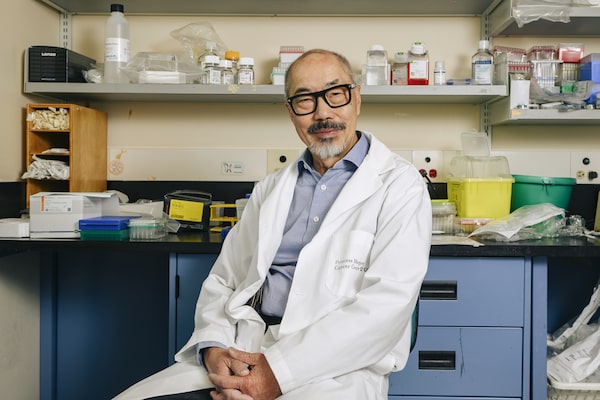
Dr. Tak Mak is a senior scientist at Princess Margaret Cancer Centre and a professor of immunology at the University of Toronto’s Temerty School of Medicine.Christopher Katsarov/The Globe and Mail
Dr. Tak Mak, a Toronto researcher who, over his career, has profoundly reshaped what we know about cancer cells, has been awarded one of the world’s most prestigious scientific prizes.
The Pezcoller Foundation-American Association for Cancer Research International Award for Extraordinary Achievement includes a cash prize of $110,500.
It is hard to overstate Dr. Mak’s impact on the cancer field.
At age 30, he discovered the structure of the T cell receptor for antigens, sometimes described as the Holy Grail of immunology. That work, decades ago, paved the way for modern immunotherapy drugs such as chimeric antigen receptor T cells (CAR T, for short), which have cured some patients of certain forms of leukemia and lymphoma.
Dr. Mak, who is 76, also made an enormous contribution to cancer biology, highlighted by his creation of generations of genetically modified mice, which have allowed countless scientists around the world to do high-level cancer research.
“Tak Mak is a pioneer of modern cancer immunology, who has also elucidated many crucial mechanisms of the cancer cell, from carcinogenesis to survival in a hostile environment, and the close connection between the immune and the nervous systems,” Dr. Enzo Galligioni, president of the foundation, said in announcing the prize.
“Because of the exceptional nature of his discoveries and the continuity of his research, he ranks among the greatest scientists.”
Dr. Mak a senior scientist at Princess Margaret Cancer Centre and a professor of immunology at the University of Toronto’s Temerty School of Medicine, took the news of the prize with customary modesty.
“The award is really not for me. It’s an accolade for everybody at [Princess Margaret] that has supported me for 40 years and, especially, for the 150 trainees who have passed through my lab over the years,” he said in an interview.
His origin story is the stuff of legend. He was born in China but raised in Hong Kong until the family emigrated to the U.S. when he was in his late teens.
Canadian researchers to build network for new cancer treatment
How Tak Mak connects the dots to make medical breakthroughs
As a young university student, he took a job cleaning test tubes in a lab for $1 an hour. When the lab’s director said he could earn $1.50 doing research, he jumped at the opportunity and caught the bug.
He completed an undergraduate degree in biochemistry and a master’s in biophysics from the University of Wisconsin, then a PhD in biochemistry at the University of Alberta before catching the eye of Ernest McCulloch, who was the director of the Ontario Cancer Institute, and the co-discoverer of stem cells.
Dr. Mak said the collaborative environment he was immersed in from the beginning is one of the keys to his success and a major reason he has never left Toronto. “People who swim in that culture ask the right questions,” he said.
The American Association for Cancer Research said Dr. Mak had made monumental contributions to the field over the years.
“His discoveries have helped to provide the scientific foundation for the immunotherapy revolution, which has saved and extended so many lives from cancer,” said Margaret Foti, executive director of the AACR. “We are deeply honoured to present Dr. Mak with this most prestigious of awards.”
Dr. Mak’s work on T cells was important in itself, but also paved the way for discoveries by other scientists, such as how cancer thwarts the immune system by switching T cells off and how that action, in turn, can be prevented with immunotherapy drugs.
“I’m happy that we have, directly or indirectly, been involved in developing drugs that have improved the lives of patients,” he said. “CAR T is a brilliant idea but it’s only the beginning. It doesn’t work for solid tumours so we have to find new and better treatments.”
The Penzcoller Foundation-AACR Award is just the latest in a long string of honours bestowed on Dr. Mak over the years.
Last year, he received the Lifetime Contribution Award from the Canadian Cancer Society. He has also received the Canada Gairdner International Award (sometimes called the Baby Nobel.)
Dr. Mak was inducted into the Canadian Medical Hall of Fame in 2009. He also holds a number of prestigious academic appointments, including being a member of the American Academy of Arts & Sciences, a fellow of the Royal Society of London and fellow of the Royal Society of Canada.
His achievements are made all the more poignant given that his wife of 29 years, Shirley, died of breast cancer in 1998. Dr. Mak’s frustration at the lack of treatment helped drive his research.
He said he has no plans to retire.
“I don’t have anything left to prove – except that cancer is not cured yet.”
His lab continues to produce good work, Dr. Mak said, and he still has an important role working with trainees and other researchers “planting seeds for flowers that can blossom tomorrow.”
 André Picard
André Picard